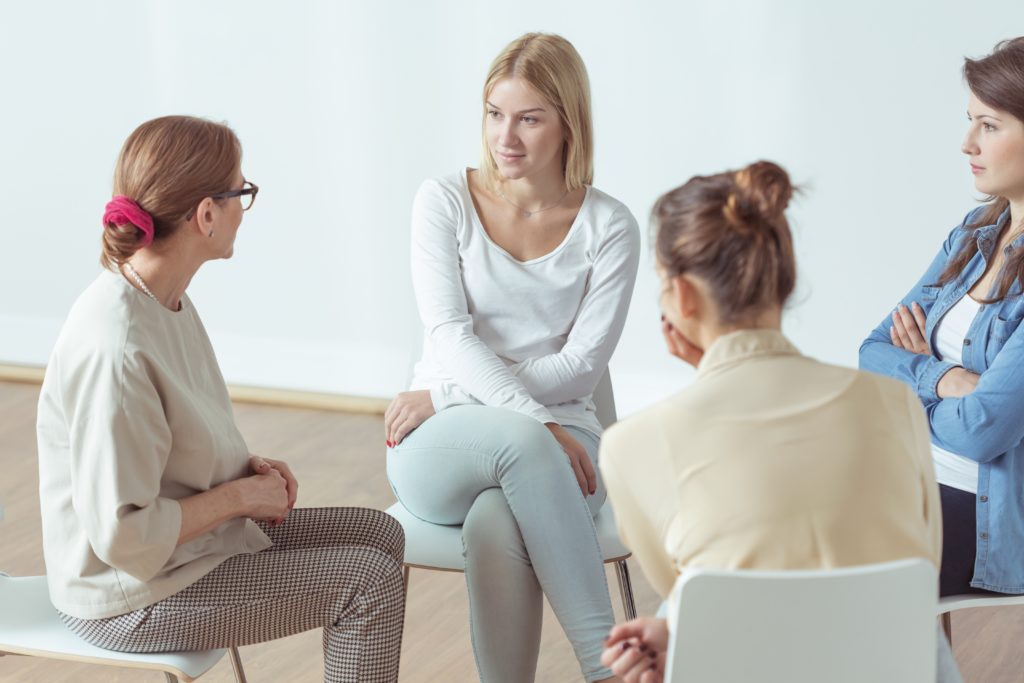Support groups often play a vital role at varying stages of the addiction treatment process. As part of some addiction treatment programs, support groups may be used to complement traditional therapy sessions. Support groups are also frequently used in transitional living environments and as part of aftercare and ongoing recovery support. Many people find that participating in support groups provides ongoing companionship, support, and friendship from peers who share similar struggles and similar goals.
What are Addiction Support Groups?
Completing an addiction treatment program at a women-focused rehab will provide you with the tools you need to maintain lasting sobriety and heal from the effects of addiction. However, the end of your primary treatment program does not signal the end of the challenges you will face over time. Returning home will inevitably present challenges to your sobriety. These triggers come in the form of people, places, or situations that remind you of drinking or using drugs. It can be very difficult to manage triggers on your own, even with the coping skills you learned during rehab.
This is where support groups can help. Addiction support groups are a group of like-minded individuals who come together regularly (often at scheduled meetings or gatherings) to provide support to other group members. Addiction support groups are designed for those who need or want a little extra help after completing a primary treatment program. Support groups can provide the extra boost you need to stick to your goals and maintain your sobriety by knowing that others are there to lift you up and share the same goals you do.
Addiction support groups, sometimes referred to as peer support groups, are sometimes included as part of your treatment program but almost always as part of a comprehensive aftercare program. These groups are a vital component of many ongoing recovery programs as they provide you with a group of supportive peers who can help you remain accountable. Also, the peers who are part of your addiction support groups we’ll be there to help you in the event of relapse or one faced with challenges to your sobriety.
What Role Do Recovery Groups Play in Treatment?
Addiction support groups play a crucial role in all phases of addiction treatment. Peer support groups (group meetings, support groups) are generally guided or supported by a leader who is usually a skilled counselor, peer leader, or social worker. Support groups not only complement the recovery process but provide a supportive environment to maintain connections with like-minded peers in the weeks and months after treatment.
It is essential to remember that addiction support groups are not a substitute for a comprehensive detox and therapy program; instead, they are a complement to traditional treatment. Peer support and shared experiences connect many support group participants. Members of the group often have similar experiences (successes and failures) with drugs and alcohol. Also, group members have often experienced similar medical and mental health side effects linked to ongoing substance abuse.
Another benefit to peer support groups is reduced isolation. Many who are newly sober struggle with the pain and loneliness of isolation. It is not uncommon for recovering addicts to have few members of their former social circles who share in their newfound sobriety. When a recovering addict feels isolated, it can worsen depression and anxiety. Peer support groups can help recovering addicts realize they are not alone and reduce feelings of loneliness.
Are There Addiction Support Groups for Women?
There are many types of addiction support groups, including popular, well-known groups such as Alcoholics Anonymous (AA) and Narcotics Anonymous (NA ). In addition to 12-step programs such as these, there are multiple peer support groups that follow a less religious format for those who are uncomfortable with the concept of “a higher power” presented as part of traditional 12-step programs. Casa Serena is a Santa Barbara rehab center specializing in women’s only treatment. Many of these peer support groups offer group sessions that cater to specific demographics. For example, LGBTQ+, youth and teens, first responders, and women-only support groups. Contact a member of our admissions team today if you would like to learn more about addiction support groups and how Casa Serena incorporates support groups into our treatment plans.



